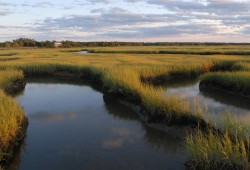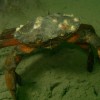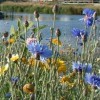World Wetlands

By the time most people read this World Wetlands Day 2022 will have been and gone. However this doesn't mean we should now put wetlands on a shelf to be looked at later. On the contrary, wetlands have a hugely important role to play in holding carbon and allowing us to envisage what will work for us and the marine environment in terms of nature based solutions. Estuary wetlands are important. Here is what Chichester Harbour Conservancy has to say:
The RAMSAR Convention signed in 1971 lists all the wetlands in the world that are considered of international importance and Chichester Harbour is on this list.
This was the first of the modern global environmental agreements and is the only one devoted to a specific ecosystem.
Some facts:
- 35% of the world’s wetlands have been lost since 1970, that is, in only 50 years.
- Wetlands are disappearing 3 x faster than forests.
- Wetland-dependent plants and animals are at risk of dying out.
- Human wellbeing, livelihoods and the health of the planet are threatened.
- Coastal wetlands sequester and store carbon up to 55 x faster than tropical rainforests.
- Historically, wetlands were seen as empty wastelands. Humans have degraded them in five ways:
- They drained them and infilled them. Remains of Victorian drainage pipes can be found on the Harbour shoreline.
- Over-extraction of water. Water is extracted from the South Downs aquifer at such a rate that it will have affected the volume of water flowing down streams to the Harbour.
- Historically, sewage treatment works were built near the towns and cities and drained into the nearest water course. Waste water is screened for solids and some works have UV treatment. Waste water is still diluted and let go with minimum screening when mixed with large volumes of storm water. Waste water still contains nutrients, medicines and other dissolved contaminants when discharged into the environment.
- Fish are a vital part of the coastal inshore food chain. For some years now the Fisheries Authority (IFCA) have designated Chichester Harbour a protected area for bass.
- People are heard saying that the seals eat all the fish. However, thinking about it, if there were no fish there wouldn’t be any seals.
- Climate change. Sea level rise is a confirmed fact. In the past few hundred years humans have built hard defences. As sea level rises, the shoreline should be allowed to progress inland but in many places this can’t happen due to the sea defences. When the distance of inter-tidal habitat between high and low tide is shortened, the first habitat to get knocked out is the saltmarsh. If nothing is done then the inter-tidal habitat disappears as it get covered by sea water all the time. This means that wildlife such as waders and some wildfowl will no longer be able to feed on the mud and will disappear. Most waders don’t swim, they paddle, and they can’t dive for their food.
What actions should we take?
Value:
We must value the multiple benefits of wetlands and how they can offer nature-based solutions.
Restore:
We must work to restore wetlands to revive the inter-tidal area, biodiversity and life.
Manage:
We must managed wetlands wisely and use them sustainably to conserve and maintain a healthy system.
- As biodiversity hotspots
- As carbon sinks
- As natural sea defences
- As sources of livelihoods and recreation
Marine Life

Our local waters throng with marine life. In Chichester Harbour pontoon pilings and mooring chains are covered in a wealth of colourful seaweeds and animals and reefs of native oysters provide a home for bright red sea squirts, hydroids and sponges. The worms, crustaceans and molluscs that provide food for Harbour birds also sustain a rich food chain below... Read More»
Nature and Conservation

The peninsula contains several internationally important nature conservation areas (see wildlife page). Extensive consultation took place to examine how the environmental character of the Manhood could be enhanced by the Medmerry managed realignment scheme and how it could benefit the local population, through sensitive management of habitat and tourism. The scheme has been successfully completed and is now managed... Read More»
Sustainability

Sustainability is just one word and yet there are over 300 definitions. In 1987, the World Commission on Environment and Development produced the best known definition of sustainability – “meeting the needs of the present without compromising the ability of future generations to meet their own needs.” The findings from this report became known as the Brundtland Report, also known... Read More»